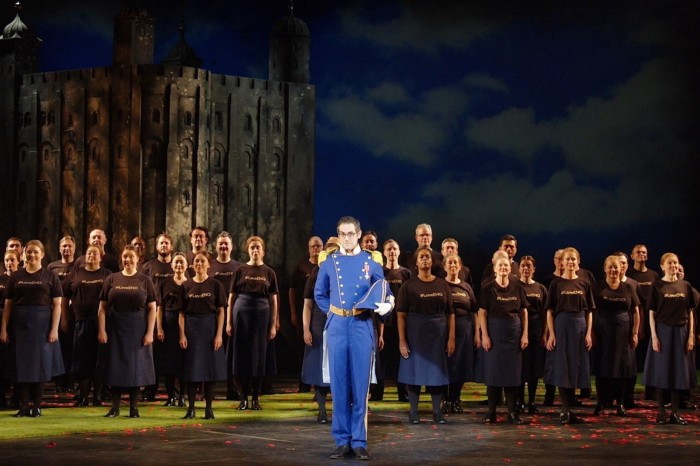
What’s up with opera? The withdrawal of all the Arts Council England’s annual £12.8mn grant from the English National Opera on November 4 was greeted with howls of outrage in some quarters, chin-stroking in others — but elsewhere nothing but a shrug. It’s all a question of perception, and — compared to Italy, Germany or France, say — in Britain opera is viewed rather warily. This bizarre, flawed, magnificent, multiple art form, which grew from the simplest of all human impulses, to tell a story and express deep feelings in song, is often seen as incurably elitist. As posh people paying ridiculous prices to dress up silly and listen to weird outdated music.
Which means, of course, that it’s hardly a prime candidate for public subsidy.
There’s back-up for this view of opera’s elitism. During the past decade Britain’s musical landscape has been transformed by the appearance of “country house” operas, privately supported, on the longer-standing Glyndebourne model: around the country Garsington, Grange Park, the Grange, Longborough, Neville Holt and more offer (usually) very good quality music in lovely garden surroundings with full bucolic dining opportunities — tapping in to one of Britain’s favourite sports, dicing with the weather. Not to mention the dressing-up opportunities, and no problem about parking the Bentley. I remember a Glyndebourne ad campaign on London’s Underground that just featured the picnic (no mention of the music), which surely said it all.
And the business model — short season, low overheads, masses of sponsorship potential — makes it work.
But all this is red-flag territory for cash-strapped public funding bodies. And yes, for a large number of punters, opera is all about experience. Market research has shown that people’s number one reason for visiting grand venues such as the Royal Opera House and Glyndebourne is . . . visiting such grand venues. The quality of the evening’s experience often comes a close second. Things that cause serious programmers sleepless nights, the music itself or star singers, come much further down the list.
So — where does this leave ENO? Precious few picnic opportunities at its West End home base, the Coliseum on St Martin’s Lane, and the lo-glam dress code barely involves an uncrumpled T-shirt. But the point that seems to have been forgotten is that ENO was supposed to be an alternative: opera for the people, sung in English, originally only by British singers — although the recent addition of international stars has certainly upped the quality of the music.
What it does offer is affordability for students, younger audiences, budding musicians and music-lovers — and, recently, broad plans for innovative UK-wide working. Where on earth, if we don’t have that, will we have the future of this strange but enduringly wonderful art form?
Out and about, I hear you say, especially outside London. Well, yes and no. Evoking the admirable levelling-up agenda is I think a red herring here. The same round of ACE cuts included Welsh National Opera (slashed by a third), Sussex-based Glyndebourne’s educational countrywide touring operation (completely cut), Britten Sinfonia, also a complete cut, the only similar orchestra in East Anglia. So regionalism is scarcely a valid argument.
The scarlet fish in question, for ENO, has become known as “Manchester” — the idea that it will be ENO’s new home. A powerful city with a thriving cultural scene of its own, it is already well served, operatically, by the excellent Opera North in Leeds. So what “Manchester” really means in this context, I’d speculate, is a scenario encapsulated in this — purely imaginary — letter from the Arts Council England to English National Opera:
Hello chaps,
Sorry about the money.
But let’s face it — you’re in a horrible bind. However wonderful your productions are, if they lose money then the more performances you do, the more money you lose. So you mount fewer and fewer performances, while retaining full-time staff, and rent out your Coliseum home over the lucrative Christmas and summer periods to other companies. Which would normally seem sensible, even bacon-saving, except when it comes to grants — because the reduced number of performances means that your subsidy-per-sold-seat, which is what we at ACE calculate, goes up and up.
The very definition of a vicious spiral.
So let’s be clear about the plan (secret code name “Manchester”)
-
You’ll leave your base at the Coliseum which you happen to own, as it was given to you by the UK government on the watch of opera-loving culture secretary David Mellor. It’s actually a brute of a building, logistically horribly complicated and expensive. But you can Airbnb it all year as a commercial performance venue.
-
We’ll bung you an “investment” of £17mn, a thinly veiled redundancy fund to enable you to shed a huge chunk of your current staff of 300. Devoted musicians, designers, lighting experts, technicians, admin staff — talented people with families and pension plans — but hey, your standing costs are just too high and that’s a big part of your problem.
-
All these excellent people can be re-employed by you on a freelance basis when you, as a vastly slimmed-down company, mount productions wherever you can find a base, on a cheaper rent than London prices. Let’s say, for instance, Manchester. Your loyal audience base will be gone, as will much of your credibility, your history, your brilliant record of nurturing British talent and your huge contribution to the capital’s night-time economy as well as the UK’s overall creative economy — arts, tourism, investment — that all our governments are so keen to boast of. But hey, the figures will look great.
Good plan?
Love and happy Christmas from all of us at ACE.
Jan Dalley is the FT’s arts editor






More Stories
Which Method Is More Effective: Video Marketing or Email Marketing?
Netiquette Rules – 10 Best Rules for Email Etiquette
Advantages of Email Encryption